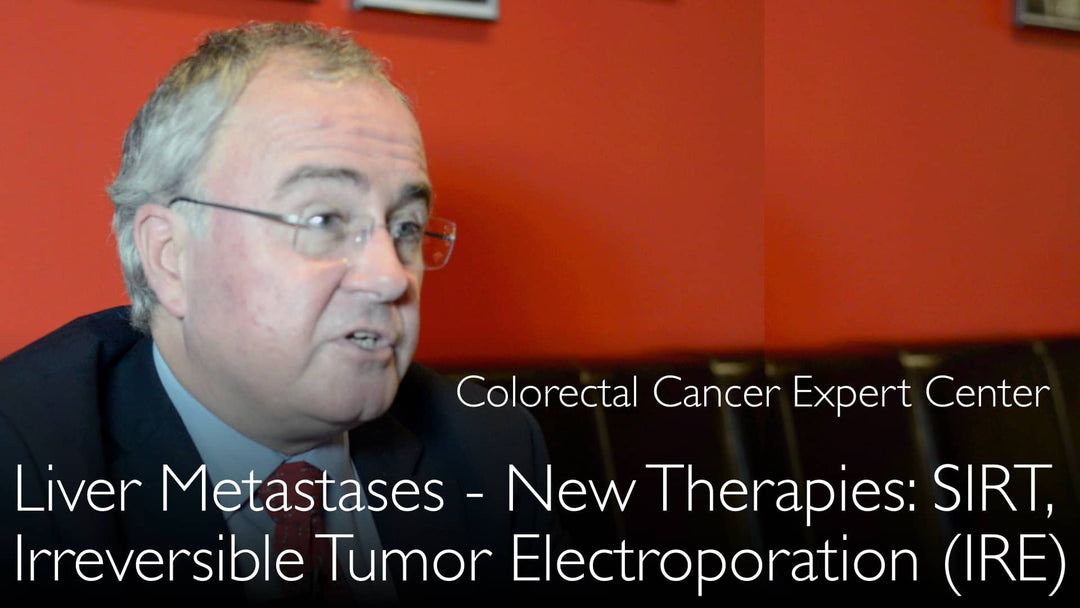Leading expert in liver cancer surgery, Dr. Graeme Poston, MD, explains advanced treatment options for stage 4 colon cancer with liver metastases. He details the role of Selective Internal Radiation Therapy (SIRT) and its promising clinical trial results. Dr. Graeme Poston, MD, discusses Transarterial Chemoembolization with DEBIRI beads (TACE-DEBIRI) as a powerful localized chemotherapy. He also covers Irreversible Electroporation (IRE), a non-thermal ablation technique. A multidisciplinary team approach is essential for creating the best personalized treatment plan for each patient.
Advanced Liver-Directed Therapies for Stage 4 Colorectal Cancer Metastases
Jump To Section
- SIRT Therapy for Liver Metastases
- TACE-DEBIRI Localized Chemotherapy
- IRE Treatment for Tumors
- Clinical Trial Data and Results
- Multidisciplinary Team Approach
- Full Transcript
SIRT Therapy for Liver Metastases
Selective Internal Radiation Therapy (SIRT) is a key liver-directed treatment for stage 4 colon cancer. Dr. Graeme Poston, MD, describes how microspheres carrying yttrium-90 are injected into the hepatic artery. This delivers a high dose of internal radiation directly to liver tumors. The radiation has a short half-life of four days, which minimizes exposure to healthy tissue.
SIRT specifically targets liver-dominant metastatic disease in advanced colorectal cancer. Dr. Anton Titov, MD, discusses this innovative approach with Dr. Graeme Poston, MD. The therapy aims to control tumor progression within the liver, a common cause of mortality.
TACE-DEBIRI Localized Chemotherapy
Transarterial Chemoembolization with DEBIRI (TACE-DEBIRI) combines localized chemotherapy and embolization. Dr. Graeme Poston, MD, explains that irinotecan-loaded microspheres are delivered via the hepatic artery. This method provides a powerful, concentrated dose of chemotherapy directly to the liver metastases.
Clinical results from Dr. Poston's group show a strong tumor response. A single TACE-DEBIRI treatment can produce necrosis similar to multiple cycles of systemic chemotherapy. This makes it a highly efficient option for treating liver lesions in stage 4 colon cancer.
IRE Treatment for Tumors
Irreversible Electroporation (IRE) is a non-thermal ablation technique for difficult-to-treat liver tumors. Dr. Graeme Poston, MD, details how needles are placed into the metastases to deliver electrical currents. This process destroys cancer cell membranes without using heat, preserving surrounding structures.
While technically challenging to perform, IRE offers a valuable tool for certain patients. Dr. Anton Titov, MD, and Dr. Poston discuss its role within a broader treatment strategy. It provides another option for controlling metastatic disease in the liver.
Clinical Trial Data and Results
Recent clinical trials provide strong evidence for the efficacy of liver-directed therapies. Dr. Graeme Poston, MD, highlights the SIRFLOX and FOXFIRE trials for SIRT therapy. These studies showed significantly improved progression-free survival in the liver for patients receiving SIRT.
Dr. Graeme Poston, MD, notes that combined data from these trials is expected to show an overall survival benefit. The key is controlling liver-specific disease progression. This data solidifies the role of these advanced techniques in modern oncology practice.
Multidisciplinary Team Approach
A multidisciplinary team is absolutely critical for optimal stage 4 colon cancer treatment. Dr. Graeme Poston, MD, emphasizes that complex cases require input from surgical, medical, and radiation oncologists. This collaborative environment ensures the best evidence-based plan is created for each individual patient.
Dr. Anton Titov, MD, agrees that this team-based model is the standard of care. It allows for a thorough discussion of all available options, from surgery to newer modalities like SIRT and TACE-DEBIRI. This approach maximizes the chance for successful outcomes.
Full Transcript
Dr. Anton Titov, MD: New technologies complement liver cancer surgery in the treatment of metastatic colon cancer. What is selective internal radiation therapy, SIRT? Transarterial chemoembolization using drug-eluting irinotecan beads, DEBIRI, is called TACE-DEBIRI. IRE is tumor irreversible electrophoresis, or irreversible electroporation, of colon cancer metastases in the liver.
A multidisciplinary team is key to making the correct treatment plan for each colon cancer patient. Stage 4 colon cancer treatment options extend beyond surgery.
Dr. Graeme Poston, MD: Chemoembolization and arterial pump therapy are used for metastatic cancer treatment in the liver.
Dr. Anton Titov, MD: This is a video interview with a leading British liver cancer surgeon specializing in colorectal cancer metastases resection. Advanced stage 4 colon cancer surgery includes selective internal radiation therapy, SIRT, for liver metastases.
Selective internal radiation therapy clinical trials, SIRFLOX and FOXFIRE, showed the effectiveness of SIRT in stage 4 colorectal cancer patients. Transarterial chemoembolization, TACE, using irinotecan beads for stage 4 colon cancer is another option. Transarterial chemoembolization using DEBIRI is called TACE-DEBIRI for metastatic advanced colorectal cancer.
IRE is tumor irreversible electrophoresis, or irreversible electroporation, of colon cancer metastases in the liver. A medical second opinion confirms stage 4 colorectal cancer diagnosis.
Dr. Graeme Poston, MD: A medical second opinion also confirms that liver metastases chemoembolization, selective internal radiation therapy, or TACE DEBIRI is possible in stage 4 colon cancer.
Dr. Anton Titov, MD: What is the best treatment for advanced stage 4 colon cancer with liver metastatic lesions? A medical second opinion helps to choose the best treatment for stage 4 colorectal cancer with liver metastases, including irreversible electroporation of metastatic lesions.
Get a medical second opinion on advanced colorectal cancer and be confident that your multimodality treatment is the best. This is a video interview with a leading expert in colorectal cancer liver metastases treatment surgery.
Stage 4 colon cancer treatment options include SIRT, TACE DEBIRI, and IRE.
Dr. Anton Titov, MD: You are a leading liver cancer surgeon with experience in the surgical resection of liver metastatic disease from stage 4 colon cancer. You also use a variety of new technologies to treat liver metastases in advanced colon cancer.
Could you please talk about the additional technology and liver-specific treatments that you use in your practice to treat advanced stage 4 colon cancer patients?
Dr. Graeme Poston, MD: Yes. There are several new technologies to treat stage 4 colon cancer with metastases to the liver. Chemoembolization for liver metastatic stage 4 cancer lesions has been used for a long time. Arterial pump therapy to treat liver metastases has also been used for a long time.
The team at Memorial Sloan Kettering Cancer Center under Professor Kemeny have really advanced arterial pump therapy experience over the last 20-odd years. They are getting very good results. But arterial pump therapy is very demanding therapy. It is demanding both for the patient and for the physician.
Placing the arterial pumps requires meticulous surgery. Maintaining the pumps requires meticulous attention to detail. It is very difficult to be able to continue to do arterial pump cancer therapy. It is tough to get the results that Professor Kemeny has obviously achieved.
Now there are other treatment methods for advanced metastatic colon cancer treatment that have emerged in the last 10 years.
Dr. Graeme Poston, MD: The first is selective internal radiation therapy, or SIRT. In SIRT, microspheres are injected into the hepatic artery that goes into the liver. They carry yttrium-90, which has a half-life of four days. The liver is selectively internally radiated.
There have just been two clinical trials in Australia, the SIRFLOX clinical trial, and in Europe, FOXFIRE, on the use of liver internal radiation therapy in stage 4 metastatic colon cancer treatment. SIRFLOX reported to ASCO in June results of treatment of stage 4 colon cancer patients with liver-dominant metastatic disease.
These stage 4 colon cancer patients had systemic chemotherapy with or without selective internal radiation therapy. That clinical trial showed that the progression-free survival of stage 4 colon cancer with liver metastases was significantly better with internal radiation therapy, SIRT.
Now we have to wait for the overall stage 4 colon cancer survival data from these clinical trials on SIRT therapy. This data has to add results of SIRT therapy from the Australasian clinical trial. The UK clinical trial on the use of internal radiation therapy, SIRT, in stage 4 colorectal cancer is coming through. Results should be out in the next year.
Then we are going to combine the dataset from two clinical trials on SIRT therapy for metastatic colon cancer into one big dataset.
Dr. Anton Titov, MD: Data should show that there is clearly a benefit of adding internal radiation therapy to treatment protocols in stage 4 colon cancer patients with liver metastases. We would expect better overall survival in those stage 4 colon cancer patients who had SIRT therapy, even though the progression-free survival between the two arms of the clinical trial was not different.
The problem in SIRFLOX and FOXFIRE clinical trials was that most of the patients with stage 4 colon cancer had metastases outside the liver in addition to liver metastases. Naturally, their metastatic colon cancer lesions outside the liver were not being treated by the internal radiation therapy, SIRT. These stage 4 colon cancer patients progressed outside of the liver at the same rate between the two arms of the clinical trial.
Dr. Graeme Poston, MD: But it is the liver metastases in stage 4 colon cancer that are the cause of death. You must delay progression of liver metastatic disease in stage 4 colon cancer. Then there should be an improvement in overall survival of patients with advanced colon cancer.
The second big change in treatment of metastases to the liver is this. We are now doing transarterial chemoembolization, TACE, using irinotecan beads. Transarterial chemoembolization using DEBIRI is called TACE-DEBIRI.
This treatment modality uses microspheres that are filled with irinotecan chemotherapy medication. In TACE-DEBIRI, irinotecan beads are again injected into the hepatic artery. TACE DEBIRI is a localized radiation and also a localized chemotherapy.
We published results of TACE DEBIRI in my group. We have done clinical trials looking at transarterial chemoembolization using DEBIRI beads in stage 4 colon cancer patients who were going to have their liver metastases resected.
We have seen a good response to one treatment of localized irinotecan beads within the liver tumors. The response to a single TACE DEBIRI treatment was similar to six or more cycles of systemic irinotecan. Treatment of metastases resulted in tumor necrosis.
Transarterial chemoembolization using DEBIRI, TACE DEBIRI, is another method for getting regional chemotherapy into the liver metastases in patients with stage 4 colon cancer.
Another thing that is coming to treat stage 4 colon cancer patients is IRE. IRE is tumor irreversible electrophoresis, or irreversible electroporation. In IRE, needles are placed into the liver tumors and electrical current is passed through the tumors.
Dr. Anton Titov, MD: No heat is involved, but the electric current destroys the tumor cell membranes. Irreversible electroporation is difficult to do well.
Dr. Graeme Poston, MD: But we have had some interesting results with irreversible electroporation in stage 4 colorectal cancer patients with liver metastases. New technologies to treat advanced colon cancer are coming to deliver liver-specific therapies.
Dr. Anton Titov, MD: It is important to place an emphasis on multimodality treatment of metastatic colon cancer.
Dr. Graeme Poston, MD: Cancer therapy decisions have to be made within the multidisciplinary team. To get the correct selection of treatment for advanced colon cancer patients, everybody has to be there.
The multidisciplinary team must discuss the rationale and the evidence for treatment. They have to discuss why a particular combination of cancer treatment is chosen.
Dr. Anton Titov, MD: Stage 4 colon cancer treatment options include Selective Internal Radiation, SIRT, Irreversible Tumor Electroporation, IRE, TACE DEBIRI, and regional chemotherapy.





